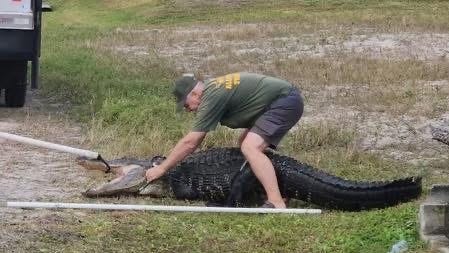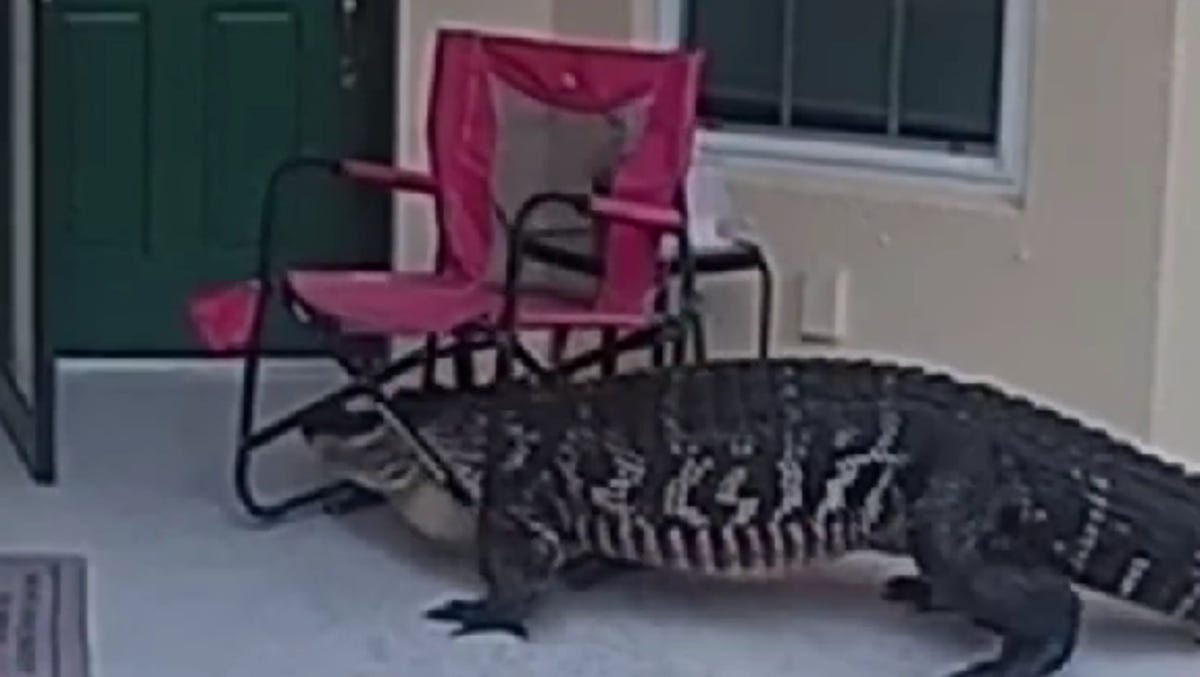
Cape Coral Florida firefighters rescue alligator stuck in storm drain
A passerby noticed the alligator was stuck in a storm drain and alerted officials.
- Discharging a firearm is often prohibited in Florida residential areas, so check local ordinances before shooting at an animal, even if it’s invasive.
- Permits are required for trapping most nuisance animals, and some species like black bears and deer, are protected.
- Invasive species like iguanas and pythons can be trapped and killed humanely, but there are still rules to follow.
Summertime in Florida means a lot of different things: Long afternoons spent on the beach, plenty of opportunities to swim in the state’s natural springs, rivers and lakes and of course, keeping your head on a swivel when it comes to wildlife.
Many of the critters in the Sunshine State, specifically reptiles, get a lot more active in the summer months. This time of year is when reports of alligators, iguanas and snakes turning up on residents’ properties (and sometimes in their homes) ramps up.
But just because you have an intruder on your property, it doesn’t give you the freedom to just “take care of it” on your own.
Here’s a refresher on nuisance animals in Florida, firearm laws and what to know if you’d like to trap or kill a nuisance animal on your property.
Can you shoot a wild animal on your property in Florida? What to know about nuisance wildlife
In general, you can’t just shoot at any critters that intrude on your property because they’re inconveniencing you. There are a lot of municipalities in Florida where you can’t fire a gun at all at your home. And how you go about killing, trapping it or calling the FWC depends on what kind of animal it is.
Whereas Floridians are encouraged to trap and humanely kill invasive animals, like iguanas or pythons, others are protected and/or require hunting permits to kill. Even if you’re trying to kill or trap an invasive species, there are still rules around how to go about it.
“It is important to remember that all of Florida’s native species contribute to balanced ecosystems. While an individual animal exhibiting behavior that conflicts with human expectations may be labeled as ‘nuisance wildlife,’ we must be careful not to apply this term to an entire species,” the Florida Fish and Wildlife Conservation Commission (FWC) says.
“Permits are required for various wildlife removal activities. Nuisance wildlife, as defined in Florida Administrative Code (F.A.C.) 68A-9.010, may be taken using live traps or snares, or, where allowed, firearms during daylight hours. All traps and snares must be inspected at least once every 24 hours.”
Before you shoot, check your local ordinances. There are some areas in Florida where you can’t shoot a firearm unless you’re at a licensed facility.
And there is no place in the state where you can shoot a firearm in any public place or on the right-of-way of any paved public road, highway, or street, according to state laws. In other words, if you see an iguana on the sidewalk — even though it’s invasive — you can’t shoot it there, unless you want to be charged with a first-degree misdemeanor.
- According to the state statute, this applies to: “Any person who knowingly discharges a firearm in any public place or on the right-of-way of any paved public road, highway, or street, who knowingly discharges any firearm over the right-of-way of any paved public road, highway, or street or over any occupied premises, or who recklessly or negligently discharges a firearm outdoors on any property used primarily as the site of a dwelling…”
- It doesn’t apply to: “A person lawfully defending life or property or performing official duties requiring the discharge of a firearm or to a person discharging a firearm on public roads or properties expressly approved for hunting by the Fish and Wildlife Conservation Commission or Florida Forest Service.”
Gator removal in Florida: What to do if you see an alligator in your backyard
If you see a gator in your yard, you might be tempted to “take care of it” yourself, but you shouldn’t. The state has a system for removing nuisance gators that end up in places they don’t belong. Removing a gator from your yard isn’t the same as calling a private critter control service or your community’s animal control, though. You have to call the FWC.
The FWC has a Statewide Nuisance Alligator Program with a gator hotline. If there is a gator in your yard or pool, call the free Nuisance Alligator Hotline at 866-FWC-GATOR (866-392-4286).
The Statewide Nuisance Alligator Program (SNAP) will issue a permit to one of its contracted nuisance alligator trappers, authorizing the removal of the gator.
The state pays its contracted nuisance alligator trappers for each job they are called out to. Calling SNAP’s toll-free number and having a trapper come to your home won’t cost you anything.
What makes an alligator a nuisance? What the Florida FWC says
An alligator is deemed a nuisance if it:
- Is at least four feet long.
- If the caller believes it poses a threat to people, pets or property.
- If it is smaller than four feet and winds up in places that are not acceptable, like swimming pools or garages, and must be removed.
“You should never handle an alligator, even a small one, because alligator bites can result in serious infection and it’s illegal. If there’s an alligator under four feet in your swimming pool, on your porch or in a similar situation, call the Nuisance Alligator Hotline,” the FWC’s website says.
How can I remove nuisance wildlife from my yard in Florida?
Even if the animal you’re trying to remove is considered a nuisance, there are still rules around how to handle certain critters.
On its website, the FWC reminds Floridians that the discharge of a firearm may be prohibited in some cities and residential areas. Check with your local law enforcement before you fire a gun in your yard (see state statutes above).
“A permit issued by FWC regional offices is required to use steel traps to take destructive mammals (excluding species prohibited by the FWC). A Gun and Light at Night Permit and a hunting license are required to use a firearm and a light at night to take nuisance beaver, bobcat, fox, opossum, rabbit, raccoon or skunk that are causing destruction of crops and/or livestock,” the FWC says.
“A Gun and Light at Night Permit is not required to take wild hog, coyote, armadillo, black or Norway rat or house mouse.”
Here’s a few animals that state law says can’t be taken as nuisance wildlife:
- Black bears
- Deer
- Bats – Except that bats may be taken either when:
- That take is incidental to the use of an exclusion device, a device which allows escape from and blocks re-entry into a roost site located within a structure (including chemical repellants), at any time from August 15 to April 15 or
- That take is incidental to permanent repairs which prohibit the egress of bats from a roost site located within a structure provided an exclusion device as described in sub-subparagraph a. above is used for a minimum of four consecutive days/nights for which the low temperature is forecasted by the U.S. National Weather Service to remain above 50° F prior to repairs and during the time-period specified.
- The following birds:
- All birds listed in 50 C.F.R. §10.13 as protected by the Migratory Bird Treaty Act unless the take is authorized by the U. S. Fish and Wildlife Service by a permit or depredation order.
- Bobwhite quail
- Wild turkey
If there is an animal intruding on your property and you’re unsure about how to make sure it’s trapped in accordance with state laws, contact your FWC regional office.







